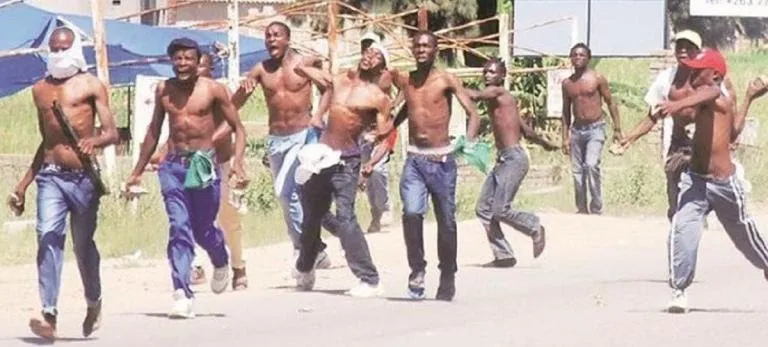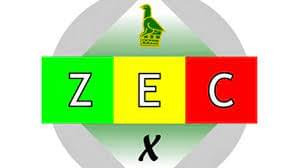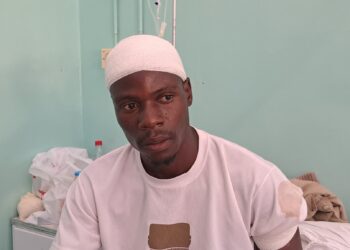Zimbabwe’s opposition supporters and human rights defenders are complaining of frequent harassment including detentions, in the aftermath of the recent elections.
President Emmerson Mnangagwa won a second term with 52.6 percent of the vote in the August 23-24 elections, but the results were rejected by his main rival Nelson Chamisa of the Citizens Coalition for Change (CCC), who garnered 44 percent.
The Zimbabwe Human Rights Forum, a grouping of over 40 civil society groups, said there was a worrying increase in cases of political violence against opposition supporters and human rights defenders.
One of the prominent cases involved the abduction and torture of a newly elected councillor in Harare and his friend by suspected state security agents.
On September 2, Womberaishe Nhende, who won a seat on a CCC ticket and his friend Sanele Mkhuhlane were picked from the latter’s home and bundled into a car by people believed to be security agents into one of the cars. The duo were allegedly assaulted and tortured before they were injected with an unknown substance and dumped about 70 km outside Harare in a bad state.
Two human rights lawyers Douglas Coltart and Tapiwa Muchineripi, who were attending to them at a Harare hospital, were arrested and charged with obstruction of justice after they objected to their clients being interviewed by detectives while they were fighting for their lives.
The forum said the cases were a tip of the iceberg as there were many ordinary people that were being victimised for not supporting the ruling party in the just ended elections.
“During the electoral period, the forum also received cases of abductions involving Givemore Chari in Maramba Pfungwe Constituency and Nelson Mukwenha in Highfields,” the Forum said.
Displacement hotspots
“The forum is worried that the attacks on civilians and human rights defenders through arrests, torture and abductions in the post-election phase are escalating whilst citizens continue to remain peaceful throughout.”
Vongai Tome, the CCC national incident reporting and welfare desk officer, said several supporters of the opposition party had been displaced by the post-election violence, especially in rural areas.
“We have 74 people who have been displaced in Mashonaland Central, particularly in Muzarabani, Mt Darwin, Maramba Pfungwe and Mudzi,” Ms Tome said.
“The 37 men, 25 women and 12 children are part of the people who were displaced by the violence that is continuing after the elections.
“We have more incidents in terms of violence that was perpetrated by the other party (Zanu PF).”
Advocate Chamisa, who visited Mr Nhende and Mr Mukhuhlane in hospital on Tuesday, said CCC supporters were being victimised because the party refused to endorse President Mnangagwa’s victory.
He said the duo’s tormentors wanted to know the opposition’s next move after it rejected the outcome of the chaotic elections.
“My deputy chief election agent (Mr) Coltart, a lawyer, and his colleague are being victimised,” the CCC leader said. ”It’s not them alone, but scores of citizens are being victimised.
“We do not expect torture. People have just voted. It was a disputed election, a fraudulent election and beyond that you torture people, for what reason?
“I am extremely concerned that people are being subjected to torture and terror on account of politics.
“The reason they were tortured is because they had said they didn’t have information on what I am doing.
“I do not do things nicodemously or undercover. What we do, we do openly, peacefully and constitutionally.”
Zero tolerance
After Advocate Chamisa refrained from challenging President Mnangagwa’s victory in the courts after arguing that the Judiciary was biased against his party, there was speculation that the opposition would stage protests as a way of pushing its demands for fresh elections.
There has been heavy deployment of police officers in Zimbabwe’s major cities since the announcement of the election results on August 26, which has been accompanied with threats from the authorities that any protests will be crushed.
President Mnangagwa was sworn in on Monday in what should be his final term in office after rising to power through a coup that toppled long time ruler Robert Mugabe in 2017.
Foreign observers, including missions from Africa that are usually measured in their assessment of elections on the continent, said the polls did not meet regional and international standards.
They cited an uneven playing field, intimidation of voters by a shadowy group linked to the ruling Zanu PF party, late delivery of election material in opposition strongholds and a biased judiciary as some of the issues that eroded the credibility of the polls.
Observers from the Southern African Development Community, European Union, African Union and the United States, among others, also condemned the crackdown against local election observers that were carrying out an independent verification of the poll results.
Farai Marapira, the Zanu PF acting director of information, said the ruling party had nothing to do with the abduction of the CCC activists or the political violence around the country.
“If there is such a person who has been victimised, the law will take its course,” Mr Marapira said.
“In the absence of such evidence, Zanu PF will just regard (the violence) as internal power dynamics within the CCC. Zanu PF does not victimise or haunt people.
“We will not pay attention to such baseless allegations because we have a mandate to serve the people. That is what we are focusing on.”
Growing crackdown
Amnesty International said the start of President Mnangagwa’s second term has been marred by human rights violations that followed the election period.
“President Mnangagwa’s inauguration for his second term as president has been severely blighted by reports of attacks against opposition party activists and threats against those trying to organise peaceful protests amid a growing crackdown on human rights, especially the rights to freedom of expression, peaceful assembly and association,” said Khanyo Farise, Amnesty International deputy director for southern Africa.
Read: Zimbabwe’s new elections facing familiar old fears
“Nobody should be persecuted simply for exercising their human rights. Everyone, regardless of their political affiliation, should be able to freely participate in peaceful activism without fear of abduction or harm. Zimbabwean authorities must immediately stop issuing inflammatory statements that could incite attacks against political activists, human rights defenders and other people.”
Ms Farise said the government must also ensure a peaceful post-election environment by respecting, protecting and ensuring the rights to freedom of peaceful assembly, association and expression.
“They must also conduct prompt, thorough, impartial, independent, effective and transparent investigations into pending cases of enforced disappearances, abductions and torture,” she added.
“Those suspected of responsibility for these crimes must face justice in fair trials. Victims and their families must be provided with access to justice and effective remedies.”
Zimbabwe has a long history of disputed elections that are often accompanied by cases of deadly political violence.
After the first post Mugabe elections in 2018, soldiers shot dead six people on the streets of Harare after protests erupted over delays in the announcement of the presidential poll results.
Zimbabwe has also been under Western sanctions for nearly two decades over allegations of election fraud and human rights violations.
Source ZimSituation










